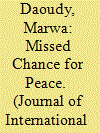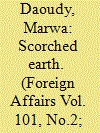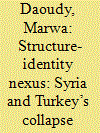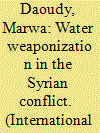|
|
|
Sort Order |
|
|
|
Items / Page
|
|
|
|
|
|
|
| Srl | Item |
| 1 |
ID:
088933


|
|
|
|
|
| Publication |
2009.
|
| Summary/Abstract |
This article addresses the conflict over the Euphrates and Tigris waters from the perspective of negotiation theories, by examining the role of power in upstream/downstream negotiations. Conceptual and empirical links are established between water, negotiation (structure, process), power (asymmetries, coalition dynamics, strategies, development of alternatives) and security (direct/indirect interests such as national security, border security, territorial claims, economic development and environmental concerns). The study concludes that asymmetries in power have favored upstream/downstream interactions towards bilateral if not basin-wide arrangements. The framework shows that traditional elements of power, such as upstream positions, military and economic resources, do not constitute the only sources of power. Bargaining power can also determine the dynamics between respective riparians. Time constitutes an important source of power, and interests vary over time when political settings and security concerns shift. Downstream or more vulnerable riparians can invert situations of power asymmetry by acting on the basin-dominant riparian's interests and thus reduce its alternatives. Syria's use of 'issue-linkage' in its interactions with Turkey over water and wider security issues serves as the primary example.
|
|
|
|
|
|
|
|
|
|
|
|
|
|
|
|
| 2 |
ID:
083646


|
|
|
| 3 |
ID:
186789


|
|
|
| 4 |
ID:
151319


|
|
|
|
|
| Summary/Abstract |
The relation between Syria and Turkey transformed from enmity in the 1990s to détente in the early 2000s, grew into amity after the rise to power of the Turkish Justice and Development Party (AKP, Adalet ve Kalkinma Partisi) in 2002, and reverted to enmity in the aftermath of the Arab Spring. This research suggests that a combination of structural and identity-based factors, at regional and domestic levels, induced the collapse of the decade-long amity. This paper builds on the notion of a “structure-identity nexus”; and determines the orientation of foreign policy outcomes from the 1990s until 2011. The discussion outlines the merits of a hybrid theoretical perspective by elaborating on Barkin’s idea of ‘realist constructivism’, which draws on two rival traditions, realism and constructivism. The structure-identity framework explains the double transformation in the relationship, considering the return to inter- and intra-state conflict in 2011. The research draws on extensive primary and secondary sources, as well as interviews carried out with key figures. In addition to the relationship between Syria and Turkey, the structure-identity nexus provides potential broader explanations that fuel the shift from amity to enmity in the complex network of states found in the Middle East.
|
|
|
|
|
|
|
|
|
|
|
|
|
|
|
|
| 5 |
ID:
174639


|
|
|
|
|
| Summary/Abstract |
How do actors weaponize water in intrastate conflicts? Existing typologies of water weaponization make deterministic differentiations between state and non-state actors and invoke opaque labels like ‘terrorism’. Furthermore, these typologies ignore how various actors engaged in violent conflict also cooperate over water, and whether water weaponization occurs beyond war. I propose a new typology for water weaponization in an analysis of the case of Syria, drawing on the leaked ‘ISIS papers’ as well as primary sources and interviews. The study begins by charting how the Ba'athist regime used water as a weapon of domination and legitimacy against its Kurdish population with infrastructure that would later facilitate the Islamic State of Iraq and Syria's (ISIS) ability to take hold of northeast Syria. I then turn to how non-state armed groups like ISIS and the Kurdish Democratic Union Party (PYD) have adopted strategies of water weaponization similar to the Syrian government by targeting and channelling water systems with major tactical implications. Finally, I show how enemy parties such as ISIS and the al-Assad regime weaponized cooperative water agreements to advance their mutual interests with violent implications for civilians. As such, I sort strategies of water weaponization into four categories: domination and legitimacy, military tools, military targets, and cooperation. In doing so, this new typology makes three main contributions, by: 1) accounting for how water is weaponized in state-society relations outside conflict; 2) refining existing definitions of water as a military tool and target; and 3) appraising the weapon-like effects of water cooperation.
|
|
|
|
|
|
|
|
|
|
|
|
|
|
|
|
|
|
|
|
|